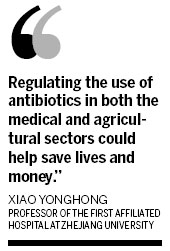China
Consumers concerned about too many antibiotics in meat: Survey
By Shan Juan (China Daily)
Updated: 2010-12-17 07:57
 |
Large Medium Small |

BEIJING - More than 90 percent of Chinese surveyed said they were worried about health hazards posed by the intake of unwanted antibiotics through meat consumption and called for mandatory labeling.
China Youth Daily's online survey of 2,528 people aged 20 to 40 followed late November's media reports that revealed feeding antibiotics to livestock is a common breeding industry practice.
"Long-term consumption causes residual antibiotics to be absorbed into the human body, creating concerns about humans' bacterial resistance," said Professor Xiao Yonghong with the First Affiliated Hospital of the Medical School of Zhejiang University.
Antibiotics-resistant diseases cause hundreds of thousands of premature deaths in the country every year and increase medical costs, experts have said.
"Regulating the use of antibiotics in both the medical and agricultural sectors could help save lives and money," Xiao said.
Nearly 62 percent of respondents said they will not buy meat contaminated with antibiotics.
While the government prohibits such practices as feeding animals antibiotics and growth hormones, "the abuse of antibiotics is still rampant", said Wang Dingmian, former chairman of the Guangdong Provincial Dairy Association.
Nearly 81 percent of the survey's respondents blamed poor government supervision.
About 58 percent denounced the lack of detailed antibiotics-use standards.
"It's a really complicated issue in China," said Huang Liuyu, director of the Institute for Disease Prevention and Control of the People's Liberation Army.
Since the 1980s, antibiotics and similar drugs have been routinely used to promote growth, and to compensate for livestock's unsanitary and crowded conditions in China and other countries, like the United States, he said.
"Given that animals in such conditions are at risk of diseases, a full ban of antibiotics in fodder would not be feasible," he said.
The European Union leads the banning of antibiotics' use in livestock feed worldwide.
China Daily
(China Daily 12/17/2010 page4)